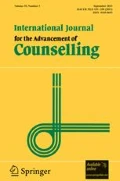Abstract
Parents are significant contributors to the development of their children. They are the primary caretakers, managers, behavior models, disciplinarians, and agents of socialization and change for their children. It is accepted that parents can be trained as effective teachers of their children with disabilities. In Turkey, there are very limited opportunities, services, schools, parent education and support services for children with disabilities and their parents. Therefore, we have been carrying out studies to contribute to the understanding of the parents, specifically, on how a child with a disability affects their life and how they can be trained to become co-teachers and co-therapists. These studies are reviewed here.
Similar content being viewed by others
References
Affleck, G., McGrade, B. J., Allen, D. A. & McQueeny, M. (1985). Mothers' beliefs about behavioral causes for developmentally disabled infants' condition: What do they signify?Journal of Pediatric Psychology 10: 293–304.
Alloy, L. B., Abramson, L. Y., Metalsky, G. I. & Teasdale, S. (1988). The hopelessness theory of depression: Attributional aspects.British Journal of Clinical Psychology 27: 5–21.
Akkok, F. (1984).The Effects of Behavioral Parent Training on the Development of the Self-Help Skills of Trainable Children. Unpublished doctoral dissertation, Ankara University, Ankara.
Akkok, F. (1987). Parents' attitudes toward their mentally handicapped child: 3 months follow up.Journal of Human Sciences 6: 17–21.
Akkok, F. & Sucuoglu, B. (1988). A new treatment approach to autism: A case study.Turkish Psychological Bulletin 6: 41–43.
Akkok, F. (1989). The Turkish reliability and validity of the QRS.Turkish Psychological Bulletin 23: 26–28.
Akkok, F. (1992). [Parent to parent workshops]. Unpublished raw data.
Akkok, F., Askar, P. & Karanci, N. A. (1992). The stress levels and causal attributions of Turkish parents.The Turkish Journal of Special Education 1: 9–14.
Allen, L. D., Bryant, M. C. & Bailey, J. C. (1986). Facilitating generalization: The effectiveness of improved parental report procedures.Behavior Modification 10: 415–434.
Baker, B. L. & Brightman, R. P. (1984). Training parents of retarded children: Program-specific outcomes.Journal of Behavior Therapy and Experimental Psychiatry 15: 255–260.
Blacher, J. (ed.) (1984).Severely Handicapped Young Children and Their Families: Research in Review. Orlando: Academic Press.
Breiner, J. & Beck, S. (1984). Parents as change agents in the management of their developmentally delayed children's noncompliant behaviors: A critical review.Applied Research in Mental Retardation 5: 259–278.
Bristol, M., Shopler, E. & McConnaughey, R. (1984, October).The Prevalence of Separation and Divorce in Unserved Families and Young Autistic and Autistic — Like Children. Paper presented at the HCEEP/DEC Early Childhood Conference, Washington.
Bulman, R. J. & Wortman, C. B. (1977). Attributions of blame and coping in the real world: Severe accident victims react to their loss.Journal of Personality and Social Psychology 36: 351–363.
Byrne, E. A. & Cunningham, C. C. (1985). The effects of mentally handicapped children on families — A conceptual review.Journal of Child Psychology and Psychiatry 26: 847–864.
Clark, D. B., Baker, B. L. & Heifetz, L. J. (1982). Behavioral training for parents of mentally retarded children: Predictions of outcome.American Journal of Mental Deficiency 87: 14–19.
Crnic, K. A., Friedrich, W. N. & Greenberg, M. T. (1983). Adaptation of families with mentally retarded children: A model of stress coping, and family ecology.American Journal of Mental Deficiency 88: 125–138.
Donovan, A. (1988). Family stress and ways of coping with adolescents who have handicaps: Maternal perceptions.American Journal on Mental Retardation 92: 502–509.
Dunst, D. J., Leet, H. P. & Trivette, C. M. (1988). Family resources, personal well-being, and early intervention.The Journal of Special Education 22: 108–116.
Faerstein, L. M. (1986). Coping and defense mechanisms of mothers of learning disabled children.Journal of Learning Disabilities 19: 8–11.
Heifetz, L. J. (1977). Behavioral training for parents of retarded children: Alternative based formats on instructional manuals.American Journal of Mental Deficiency 82: 194–203.
Holroyd, J. (1974). The questionnaire on resources and stress: An instrument to measure family responses to a handicapped family member.Journal of Community Psychology 2: 92–94.
Holroyd, J. (1987).Questionnaire on Resources and Stress. Brandon: Clinical Psychology Pub. Co., Inc.
Humes, C. W. (1986). Parent counselling in special education: Case description of a novel approach.The School Counsellor 33: 345–349.
Imamoglu, O. E. (1987). An interdependence model of human development. In Kagitcibasi (ed.),Growth and Progress in Cross-Cultural Psychology. Lisse: Swafts and Zeitlinger.
Karanci, N. A. (1986). Causal attributions for psychological illness among Turkish psychiatric in-patients and their relationships with hope.International Journal of Social Psychology 32: 3–13.
Karanci, N. A. (1988). Patterns of depression in medical patients and their relationship with causal attributions for illness.Psychotherapy and Psychosomatics 50: 207–215.
Katz, S. & Kenig, D. (1985). A group individual method of training parents for teaching self-help skills to their mentally handicapped children.British Journal of Mental Subnormality 31: 80–87.
Kazak, A. E. (1987). Families with disabled children: Stress and social network in three samples.Journal of Abnormal Child Psychology 15: 137–140.
Lazarus, R. S., DeLongis, A., Folkman, S. & Gruen, R. (1985). Stress and adaptational outcomes: The problem of confounded measures.American Psychologist 40: 770–779.
McConachie, H. (1986).Parents and Young Mentally Handicapped Children: A Review of Research Issues. London: Croom Helm.
Norcoss, J. C., Prochaska, J. O., Guadognoli, E. & DiClemente, C. C. (1984). Factor structure of the levels of attribution and change (LAC) scale in samples of psychotherapists and smokers.Journal of Clinical Psychology 40: 519–528.
Traustadottir, R. (1991). Mothers who care.Journal of Family Issues 12: 211–228.
Vincent, K. R. (1990). Coping with disability: The individual or a family member's.Social Behavior and Personality 18: 1–6.
Welch, M. (1988).Holding Time. New York: Simon and Schuster.
Wiener, B. (1986).An Attributional Theory of Motivation and Emotion. New York: Springer-Verlag.
Author information
Authors and Affiliations
Rights and permissions
About this article
Cite this article
Akkok, F. An overview of parent training and counselling with the parents of children with mental disabilities and autism in Turkey. Int J Adv Counselling 17, 129–138 (1994). https://doi.org/10.1007/BF01407969
Issue Date:
DOI: https://doi.org/10.1007/BF01407969



